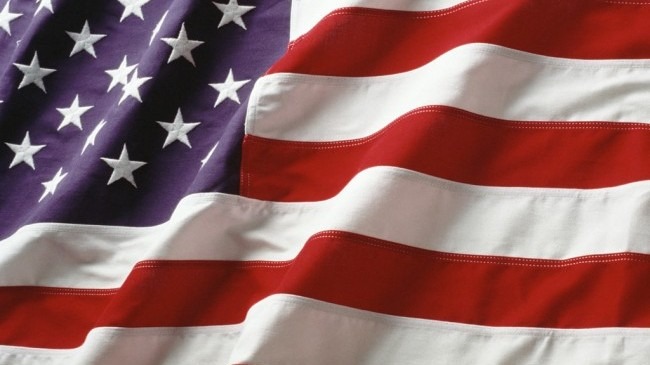
While some students recite the Pledge of Allegiance and stand for the National Anthem, others choose not to do either.
“It’s your choice.”
By CALEB HAYES – Editor-in-Chief
“Please stand for the National Anthem to be followed by the Pledge of Allegiance.”
These words blare from the intercom daily, but the request is often met with apathy. Students continue to talk or work as the anthem plays overhead, and unless a class’ instructor demands that the students stand and recite the Pledge of Allegiance, it is ignored entirely.
For 180 days each school year, students are asked to robotically chant the 31-word mantra. This practice starts for students as they enter into the public school system as kindergartners and continues through their senior year, a total of 2,340 pledges by graduation.
Georgia Code (Title 20 Section 20-2-310) grants students the opportunity to recite the pledge, but gives students the choice. Many have decided to avoid involvement because the pledge, and the patriotic implications for which it stands, has been used in such excess repetition that all of its meaning has been diminished.
No one wakes up in the morning and recites the pledge at home, and there isn’t a job in the world that requires its performance outside of school or the military, so why must it be a part of our daily schedule?
The reasons are slim. While it stands as a symbol of pride for our country and aims to implement respect for America within its students, those feelings are ultimately lost after the eight-hundredth time.
This ritual has become such a habit for students that these goals have been replaced with annoyance. The pledge no longer stands as a symbol for respect or pride for America and the deterioration of its meaning derives from the constant recurrence from within school.
The rules for participation in the Pledge of Allegiance are extremely vague at Clarke Central High School. Within the Clarke County School District, participation in the Pledge of Allegiance is optional for students, and therefore the same rule should apply for CCHS.
Despite this, some teachers demand that their entire class stand and recite, and punish students who don’t participate for insubordination.
Teachers, security guards and the administrators themselves should not be frustrated with students who ignore this daily procedure.
When students opt out of reciting the pledge, it isn’t always a blatant act of disrespect. The oath of loyalty simply seems useless to enact on a daily basis.
“Show some respect.”
By OLIVIA MURPHY – Public Relations Manager
There are seven billion people in the world according to the United States Census Bureau, and in the US alone, there are over 312 million.
Our US Armed forces may have not decided to protect this many people when they signed their name on the dotted line while drafting into war, however they did chose to protect this country.
Yet, at Clarke Central High School, when we hear the National Anthem playing in the background and our teachers instruct us to stand up for the Pledge of Allegiance, the fact that only a couple people are standing is what’s unbelievable to me.
Some students may see standing and reciting the Pledge as a tedious action, but it doesn’t matter how many times you recite it or stand up when your instructors ask you to. Standing up during the Pledge represents the respect that you have for the thousands of soldiers who serve in our Armed forces to protect not just lives, but also our freedoms as Americans whereas in some countries, a particular group of people aren’t granted the privileges that we have.
Think about it: When you wake every morning to get ready for school wondering if you did last night’s homework, a girl in Africa is waking up wondering if she will be able to go to school where in some African cultures, the education of women is limited.
Our freedom to live is what our soldiers are fighting for, the same way you are granted the opportunity to learn.
Students may tire from saying the Pledge of Allegiance over and over, but I’ve never heard of a solider getting tired of protecting their country.
I can understand that the religious implications within the Pledge may seem uncomfortable for some people, but our nation has been built on religion.
Immigrants during the colonial stages of the U.S. including the Pilgrims came here to escape religious persecution in their countries. The Native American tribes that established our country believe in spirits and performed ritual celebrations to worship the Gods. If these different cultures didn’t introduce the religions we practice today, imagine how many religions we would have if they never came here.
It’s your First Amendment right to disagree with the phrasing behind the Pledge of Allegiance or to get tired of saying it, but that should not be an excuse to disrespect it.
You can say the Pledge twenty different times in school, but by at standing for it when the National Anthem plays on the intercom, it shows the respect that you have for our soldiers of every war, not just our country.
